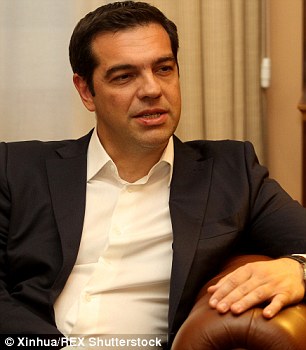Greek prime minister capitulates over taxes, privatisation and pensions and goes cap in hand to Europe for more money... but now has to convince his hard-left party to agree
- Greece has submitted a new set of reform proposals to eurozone leaders
- It will form a last ditch attempt to reach an agreement with its creditors
- Details of proposals will be reviewed ahead of crucial summit on Sunday
- Greek leaders have pledged to reform the pension system and raise taxes
- In return, they have asked creditors for a three-year debt adjustment plan
Alexis Tsipras is facing the difficult challenge of trying to convince his party to back a harsh new austerity package in return for a €53.5 billion bailout and restructuring of debt repayments.
Less than a week after urging his country to reject milder cuts in a referendum, the Greek Prime Minister is now asking his hard left Syriza party to effectively sign off on a dramatic U-turn.
If backed by the party and accepted by creditors, the reforms would raise corporate and shipping tax, increase the country's 'luxury' tax and implement a levy on TV advertisements immediately.
It pledged to complete the tender process for the privatisation of its regional airports, as well as ports in Piraeus, Thessaloniki and Hellinikon. The Government would also transfer its remaining shares in Greek telecoms companies into private hands.
All of this comes just 10 days after 60 per cent of Greek voters said they opposed further austerity measures in the July 5 referendum - a position the country's hard left government supported.
Scroll down for video

All smiles: Less than a week after urging his country to reject milder cuts in a referendum, Greek Prime Minister Alexis Tsipras is now asking his hard left Syriza party to effectively sign off on austerity measures

Decision time: Former Greek Finance Minister Yanis Varoufakis smiles during a session of ruling Syriza's leftist party parliamentary group at the Parliament building in Athens today

Frustration: While Greek politicians scramble to get a €53.5 billion bailout, senior citizens were seen queuing outside banks in Athens this morning in the hope of withdrawing a maximum €120 from their pension funds
The proposals were sent to rescue creditors for approval at emergency meetings of European Union leaders and finance ministers over the weekend. The proposed new bailout worth nearly €53.5 billion would be Greece's third since it lost market access in 2010.
But in an unusual procedure, Tsipras is first seeking authorization from parliament to negotiate with the creditors based on the proposal in a vote Friday. He is essentially asking his Syriza party to sign off on the U-turn despite more than 60 percent of voters opposing more austerity in the July 5 referendum.
Tsipras was convening his party's lawmakers for discussions Friday morning before the parliamentary debate.
The coalition government has 162 seats in the 300-member parliament and pledged backing on a deal from a large section of opposition lawmakers. But failure to deliver votes from his own government would likely topple his coalition.
A prominent dissenter, Energy Minister Panagiotis Lafazanis, urged the government not to sign a third bailout.
'The choices we have are tough ... but the worst, the most humiliating and unbearable choice is an agreement that will surrender, loot and subjugate our people and this country,' he told a business conference on Thursday, before the Greek proposal was finalized.

Despair: A pensioner waits to withdraw part of his pension at a National Bank branch in Athens this morning

Scramble: Elderly men and women wait outside the main gate of the national bank of Greece to withdraw a maximum of 120 euros from their pension pots in central Athens earlier this morning

A pensioner holds a priority ticket as he waits outside a bank to withdraw part of his pension in Athens today
Speaking on BBC Radio 4's Today programme this morning, Syriza MEP Stelios Kouloglou said the austerity climb-down was the only way Greece could survive the current economic crisis.
'I think we have no other option (than to accept the creditors' claims). The other is to exit the eurozone but neither the society or the administration is prepared to do so. If you don't have a plan B then you have the accept the (stronger) force,' he said.
Asked what the point in the holding a referendum was when the government U-turned on the terms only days later, Kouloglou said: 'The creditors wanted it in the first place. There's also a culture of reprisals here, people will be punished because they voted no to the creditors.'
Speaking of Greece's proposal, the MEP said he thought the request to restructure Greece's debt repayments was key to the agreement, branding the current arrangement 'unsustainable'.
Michael Fuchs, Germany deputy chairman of CDU told the programme:
'At the moment we are just studying it (the proposals) and we really have to make sure the debt sustainability is now served, if that is not functioning (then) it doesn't make sense.'
'We have to check whether these measures, these new rules which they have proposed, are capable to really serve that idea. It's very important that we go forward but it's not our mistake or our fault. The Greeks have been waiting days to come up with proposals and now we have to check it.'
I have a problem to trust it. What's the difference between Sunday and today? On Sunday the Greek people voted against these measurements, and against all these kinds of increases of VAT and (things like) all this. Now what is the situation? I'm sorry,'

Pro-EU protesters gathered in front of the Greek parliament in Athens last night during a demonstration by a 'we stay in Europe' movement

The protest came as their country's leaders handed in a set of reform proposals that they hope will allow them to remain in the eurozone and receive a third bailout

A man drapes the European Union flag over his shoulders during last night's pro-Euro rally
Beating a midnight deadline by almost two hours, the spokesman for Dutch eurogroup President Jeroen Dijsselbloem tweeted that the proposals were received and that it was 'important for institutions to consider these in their assessment' of the Greek situation.
News the plans have been finalised comes as the country's Prime minister Alexis Tsipras met with finance ministry officials a day after the government requested a new three-year aid programme from Europe's bailout funds - and promised to immediately enact reforms, including to taxes and pensions, in return.
Earlier yesterday, EU Economics Commissioner Pierre Moscovici had warned it was a 'decisive' day for Europe.
He had stated he was hopeful a new Greek bailout deal was possible, in exchange for 'concrete, complete' reform proposals.
'I have the sense that the dialogue is established, or restored, and that there is a way out,' Mr Moscovici said.


The spokesperson for Eurogroup president Jeroen Dijsselbloem tweeted the proposals had been received and no further comment would be made until they were assessed
Failure to reach a deal could be the first step towards Greece leaving the shared euro currency.
The last-minute negotiations come amid bank closures in Greece, where capital controls have been imposed that restrict Greeks to cash withdrawals of 60 euro (£43) per day.
The closures have been extended through to Monday.
Pensioners without bank cards have been particularly hard hit as they have struggled to access their accounts. Certain bank branches opened last week to allow them to withdraw a weekly allowance of 120 euro each.
The government announced on Wednesday this was being renewed so they could withdraw the same sum. Hundreds of elderly Greeks lined up outside banks yesterday morning.
Hopes for a deal rose after Donald Tusk, who chairs the EU summits, said that Greece's plan would have to be matched by creditors' suggestions on how to make the country's debt manageable in the longer term.
'The realistic proposal from Greece will have to be matched by an equally realistic proposal on debt sustainability from the creditors. Only then will we have a win-win situation,' Mr Tusk said.


Donald Lusk, who chairs the EU summits, said earlier yesterday that Greece and Prime Minister Alexis Tsipras's (pictured left) plan would have to be matched by realistic suggestions from its creditors

Withdrawing her pension: An elderly woman leaves a branch of the National Bank in the city of Iraklio in the island of Crete yesterday morning
Easing the terms of Greece's existing bailout loans has been a key dividing issue in the bailout talks for months - with Greece and the International Monetary Fund pressing in favour and key European states like Germany resisting the idea.
Greece's proposals will now be examined by the 'troika' of creditor institutions - the European Commission, the European Central Bank and IMF - before going on to political leaders.
Mr Tusk, the former Polish premier, has set a special summit of all 28 European Union members on Sunday as the final deadline for a deal to bail out Greece and keep it in the European single currency.
Greece's Leftist premier Tsipras has called for a reduction of Greece's massive €320 billion debt mountain to be part of any deal for its third international bailout since 2010.
But Germany and many other eurozone nations reject any move to write off Greek debts, especially after Greeks in a referendum last weekend backed Tsipras's decision to reject the creditors' demands for further austerity.

Desperate: Pensioners argue, push and shove as they tried to enter a National Bank of Greece branch in the city of Iraklio on Crete


Controversial: Michael O'Leary (right) said too many Greeks retired while still of working age in order to spend their lives 'in a cafe drinking coffee'. He also branded Greek Prime Minister Alexis Tsipras (left) 'a lunatic'
A spokesman for the European Commission said Wednesday that its president, Jean-Claude Juncker, had called earlier this week for debt sustainability to be part of a Greek deal 'under the understanding that that would come later in October, provided that the other conditions would have been met.'
IMF chief Christine Lagarde said Wednesday that a new programme to prop up Greece's finances would require creditors to restructure debt in addition to the reforms Athens must make.
'The other leg is debt restructuring, which we believe is needed in the case of Greece for it to have debt sustainability,' she told a conference in Washington.
US Treasury Secretary Jacob Lew made similar comments, saying the IMF was right to focus on the issue and that Greece's debt 'is not sustainable.'
But German Chancellor Angela Merkel said after an emergency summit of the 19 nations that use the single currency on Tuesday that debt relief would be illegal under the EU's treaties.
'A haircut is out of question,' she said when asked about the possibility of restructuring Greek debt.
-
 Beach goer captures aftermath of beach explosion
Beach goer captures aftermath of beach explosion
-
 Horrifying moment slingshot ride cable SNAPS
Horrifying moment slingshot ride cable SNAPS
-
 Solar cycle: The sun's 11-year heartbeat explained
Solar cycle: The sun's 11-year heartbeat explained
-
 First look behind the scenes: Star Wars: The Force Awakens
First look behind the scenes: Star Wars: The Force Awakens
-
 'Just take the f****** picture': Prince Philip loses his...
'Just take the f****** picture': Prince Philip loses his...
-
 'What the f***?' Can you hear McDonald's Minions swearing?
'What the f***?' Can you hear McDonald's Minions swearing?
-
 'Let's go upstairs' dog reacts to owners command with guilty...
'Let's go upstairs' dog reacts to owners command with guilty...
-
 Bicycle thief rips woman's phone out of her ands
Bicycle thief rips woman's phone out of her ands
-
 Woman throws HUGE tantrum after her phone battery died
Woman throws HUGE tantrum after her phone battery died
-
 Innovative Tangle Teezer blow-drying brush is hugely popular
Innovative Tangle Teezer blow-drying brush is hugely popular
-
 Shocking moment taxi refuses to stop after hitting pram
Shocking moment taxi refuses to stop after hitting pram
-
 Couple parody Shut Up and Dance to announce pregnancy
Couple parody Shut Up and Dance to announce pregnancy
-
 Isis's female Gestapo wreaking terror on their own sex: They...
Isis's female Gestapo wreaking terror on their own sex: They...
-
 Police left baffled by mystery beach explosion that launched...
Police left baffled by mystery beach explosion that launched...
-
 And after the wedding came the party! Glamorous Nicky Hilton...
And after the wedding came the party! Glamorous Nicky Hilton...
-
 'Yes my hands are full! Sometimes with two glasses of wine':...
'Yes my hands are full! Sometimes with two glasses of wine':...
-
 Trump takes incendiary immigration views to GOP faithful:...
Trump takes incendiary immigration views to GOP faithful:...
-
 Second Tunisia terror attack foiled: Five ISIS extremists...
Second Tunisia terror attack foiled: Five ISIS extremists...
-
 The lonely Lothario: He bathed in bubbly, out-caroused...
The lonely Lothario: He bathed in bubbly, out-caroused...
-
 When's it your turn, Paris? Awkward moment Hilton heiress...
When's it your turn, Paris? Awkward moment Hilton heiress...
-
 Look, no hands! Unstoppable Williams wins the 'Serena Slam'...
Look, no hands! Unstoppable Williams wins the 'Serena Slam'...
-
 Musician Beck sells his surprisingly ordinary looking...
Musician Beck sells his surprisingly ordinary looking...
-
 How doctor dubbed 'the worst fraudster in American history'...
How doctor dubbed 'the worst fraudster in American history'...
-
 Six teens 'murdered New Mexico father on his driveway as...
Six teens 'murdered New Mexico father on his driveway as...




















































































































































































































